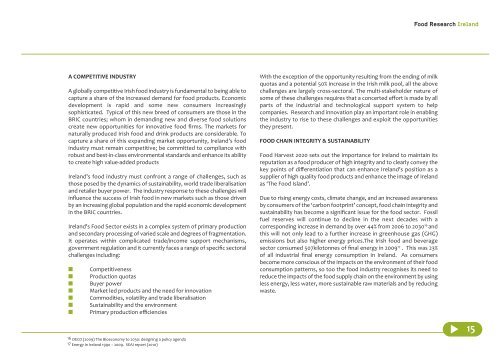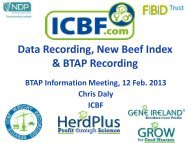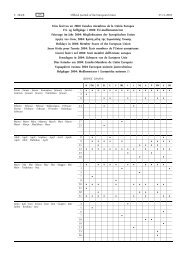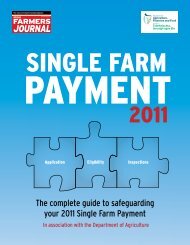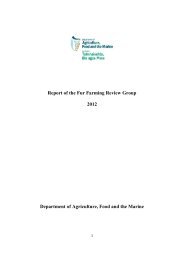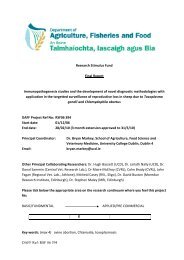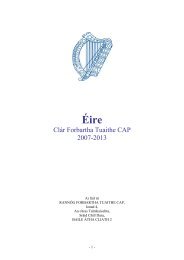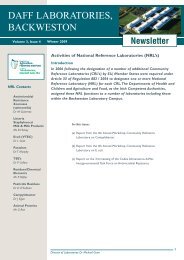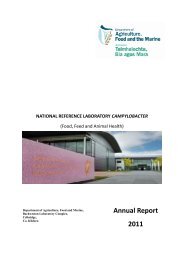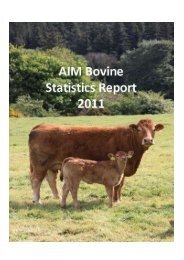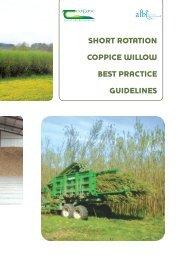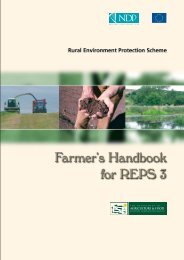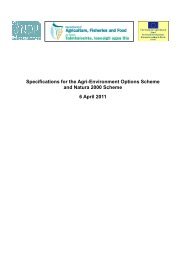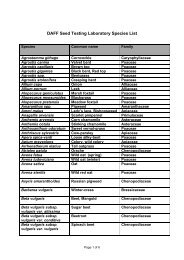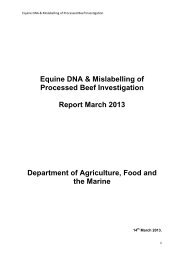Food Research Ireland - Department of Agriculture
Food Research Ireland - Department of Agriculture
Food Research Ireland - Department of Agriculture
Create successful ePaper yourself
Turn your PDF publications into a flip-book with our unique Google optimized e-Paper software.
A COMPETITIVE INDUSTRY<br />
A globally competitive Irish food industry is fundamental to being able to<br />
capture a share <strong>of</strong> the increased demand for food products. Economic<br />
development is rapid and some new consumers increasingly<br />
sophisticated. Typical <strong>of</strong> this new breed <strong>of</strong> consumers are those in the<br />
BRIC countries; whom in demanding new and diverse food solutions<br />
create new opportunities for innovative food firms. The markets for<br />
naturally produced Irish food and drink products are considerable. To<br />
capture a share <strong>of</strong> this expanding market opportunity, <strong>Ireland</strong>’s food<br />
industry must remain competitive; be committed to compliance with<br />
robust and best-in-class environmental standards and enhance its ability<br />
to create high value-added products<br />
<strong>Ireland</strong>’s food industry must confront a range <strong>of</strong> challenges, such as<br />
those posed by the dynamics <strong>of</strong> sustainability, world trade liberalisation<br />
and retailer buyer power. The industry response to these challenges will<br />
influence the success <strong>of</strong> Irish food in new markets such as those driven<br />
by an increasing global population and the rapid economic development<br />
in the BRIC countries.<br />
<strong>Ireland</strong>’s <strong>Food</strong> Sector exists in a complex system <strong>of</strong> primary production<br />
and secondary processing <strong>of</strong> varied scale and degrees <strong>of</strong> fragmentation.<br />
It operates within complicated trade/income support mechanisms,<br />
government regulation and it currently faces a range <strong>of</strong> specific sectoral<br />
challenges including:<br />
■ Competitiveness<br />
■ Production quotas<br />
■ Buyer power<br />
■ Market led products and the need for innovation<br />
■ Commodities, volatility and trade liberalisation<br />
■ Sustainability and the environment<br />
■ Primary production efficiencies<br />
16 OECD (2009) The Bioeconomy to 2030: designing a policy agenda<br />
17 Energy in <strong>Ireland</strong> 1990 – 2009. SEAI report (2010)<br />
With the exception <strong>of</strong> the opportunity resulting from the ending <strong>of</strong> milk<br />
quotas and a potential 50% increase in the Irish milk pool, all the above<br />
challenges are largely cross-sectoral. The multi-stakeholder nature <strong>of</strong><br />
some <strong>of</strong> these challenges requires that a concerted effort is made by all<br />
parts <strong>of</strong> the industrial and technological support system to help<br />
companies. <strong>Research</strong> and innovation play an important role in enabling<br />
the industry to rise to these challenges and exploit the opportunities<br />
they present.<br />
FOOD CHAIN INTEGRITY & SUSTAINABILITY<br />
<strong>Food</strong> Harvest 2020 sets out the importance for <strong>Ireland</strong> to maintain its<br />
reputation as a food producer <strong>of</strong> high integrity and to clearly convey the<br />
key points <strong>of</strong> differentiation that can enhance <strong>Ireland</strong>’s position as a<br />
supplier <strong>of</strong> high quality food products and enhance the image <strong>of</strong> <strong>Ireland</strong><br />
as ‘The <strong>Food</strong> Island’.<br />
Due to rising energy costs, climate change, and an increased awareness<br />
by consumers <strong>of</strong> the ‘carbon footprint’ concept, food chain integrity and<br />
sustainability has become a significant issue for the food sector. Fossil<br />
fuel reserves will continue to decline in the next decades with a<br />
corresponding increase in demand by over 44% from 2006 to 2030 16 and<br />
this will not only lead to a further increase in greenhouse gas (GHG)<br />
emissions but also higher energy prices.The Irish food and beverage<br />
sector consumed 507kilotonnes <strong>of</strong> final energy in 2009 17 . This was 23%<br />
<strong>of</strong> all industrial final energy consumption in <strong>Ireland</strong>. As consumers<br />
become more conscious <strong>of</strong> the impacts on the environment <strong>of</strong> their food<br />
consumption patterns, so too the food industry recognises its need to<br />
reduce the impacts <strong>of</strong> the food supply chain on the environment by using<br />
less energy, less water, more sustainable raw materials and by reducing<br />
waste.<br />
<strong>Food</strong> <strong>Research</strong> <strong>Ireland</strong><br />
▼<br />
15


